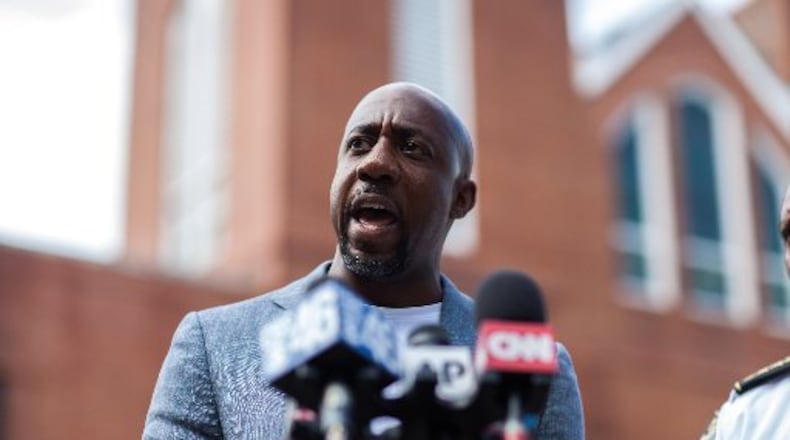The Rev. Raphael Warnock said Friday he has decided not to challenge Sen. Johnny Isakson in next year's election, sending Democrats scrambling to find another contender to run against the Republican.
Warnock, who pastors Martin Luther King Jr.'s historic Atlanta church, had for months openly contemplated a campaign for the seat. He met with state Democratic leaders, prepared his church members for the possibility of a run and landed a speaking role at the party's signature event.
But the 46-year-old said in a statement to The Atlanta Journal-Constitution that his plan to continue pastoring Ebenezer Baptist Church while also launching a Senate bid proved too complicated.
"As much as I would have been honored to run and to serve, I have decided that, given my current pastoral and personal commitments, this is not a good time," he said, adding that he will stay involved in policy issues such as voting rights and criminal justice reform.
Warnock's decision means Democrats will have to resume their search to find another contender to run against Isakson, a two-term incumbent who recently announced he had Parkinson's disease.
Democrats saw Warnock, 46, as an outsider who could have helped excite the state's black electorate with a wholehearted embrace of President Barack Obama's initiatives. Several other potential candidates ruled themselves out, and several Democratic leaders rallied around him.
But his newcomer status and his plans to stay on the pulpit while also running for statewide office posed significant challenges. Questions swirled around whether he could maintain his day job without running afoul of Internal Revenue Service restrictions that prevent tax-exempt churches from actively engaging in political campaigns.
"During discussions with Dr. Warnock it became clear that he would face significant obstacles in putting together the kind of operation necessary to run a successful statewide campaign,” said a national Democrat with direct knowledge of the attempts to recruit him.
Any Democrat who challenges Isakson will face daunting odds in Georgia. The 70-year-old enjoys high name recognition, popularity across the aisle, solid relations with black leaders and more than $4 million in his campaign coffers.
But Isakson has also faced questions about his health since he revealed in June that he has suffered from Parkinson's for about two years. In that announcement, Isakson told reporters that the disease was in its earliest stages and that it would not jeopardize his ability to serve another six-year term.
That insistence hasn't stopped the rumors that he will not run – talk that Isakson's camp firmly denies. So far, he's only attracted one challenger: Republican Derrick Grayson, a MARTA engineer and minister who garnered 1 percent of the vote in the 2014 Senate primary.
Warnock's decision is a setback for Democrats who have struggled for months to find a viable candidate to challenge Isakson after last year's humbling defeats. The GOP swept every statewide office in 2014 and no Democrat topped 45.2 percent despite youthful candidates with brand-name political legacies.
After some leading Democrats passed on next year's Senate contest – House Minority Leader Stacey Abrams, state Rep. Stacey Evans and former U.S. Rep. John Barrow were among those scouted for a run – Democratic operatives shifted their focus to Warnock.
Now that he’s ruled himself out, party leaders have reopened their conversations with another round of potential recruits. Among the names being floated are former Atlanta Mayor Shirley Franklin, state Rep. Scott Holcomb and Valarie Wilson, the head of the Georgia School Board Association and a former superintendent candidate.
Others, including former state Sen. Jason Carter, Atlanta Mayor Kasim Reed and Evans, have indicated they aren't interested.
The national party still has high hopes that it can find a high-profile candidate for the contest – someone who can also help the eventual Democratic presidential nominee turn out more voters. But the clock is ticking.
“Democrats are confident that we will find a great candidate in Georgia who will run a strong campaign and make this one of the most competitive races in the country,” said Justin Barasky of the Democratic Senatorial Campaign Committee. “The higher turnout that comes in presidential elections will be very advantageous.”
Here's Warnock's full statement:
After careful thought and prayerful consideration, I have decided that I will not run for the United States Senate in 2016. I am thankful for the overwhelming support from my congregation and grateful to the many Georgians who have expressed great interest in my candidacy. They have urged me to carry their concerns for a state that works well for everyone to Washington. As much as I would have been honored to run and to serve, I have decided that, given my current pastoral and personal commitments, this is not a good time. Nonetheless, I will continue to raise my voice and channel my activism in addressing voting rights, wealth inequality, equal pay for women and criminal justice reform all toward the aim of making Georgia better and America stronger.
And here's the statement from Democratic Party of Georgia head DuBose Porter:
"We respect Rev. Warnock's decision and appreciate him taking this under consideration. We wish him only the best. The reverend should be admired for the love he has for his church family and our state. Running for public office is a weighty affair, and most often a life-changing journey. Rev. Warnock's journey has just begun, and Georgia Democrats look forward to working with him to make our state a better place."
About the Author
The Latest
Featured




